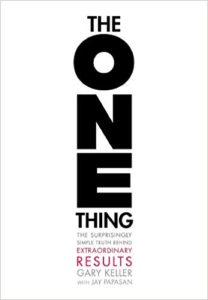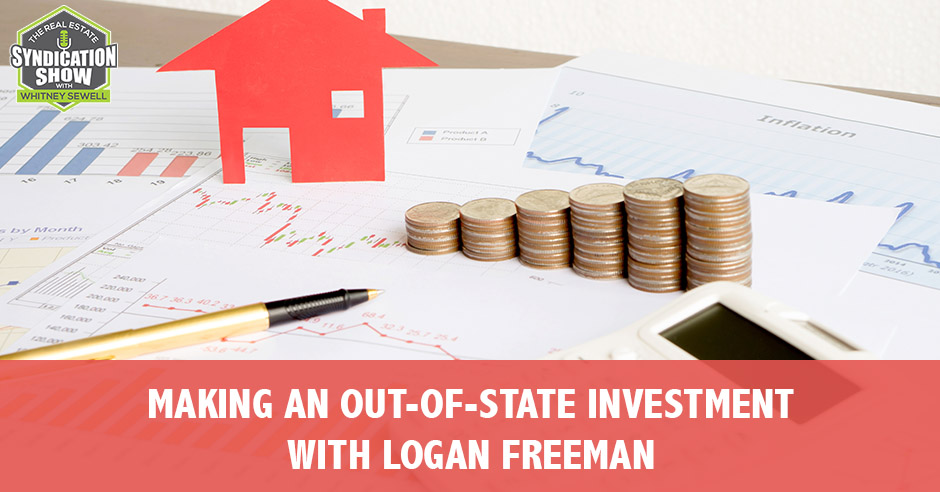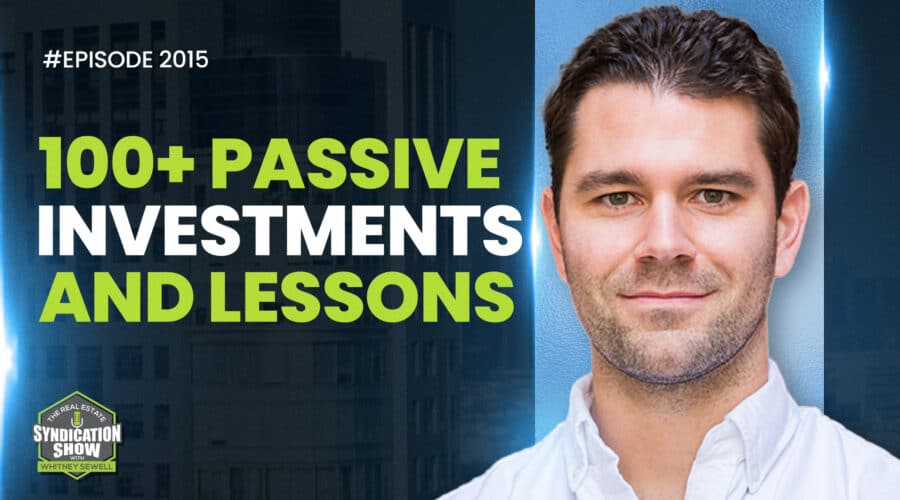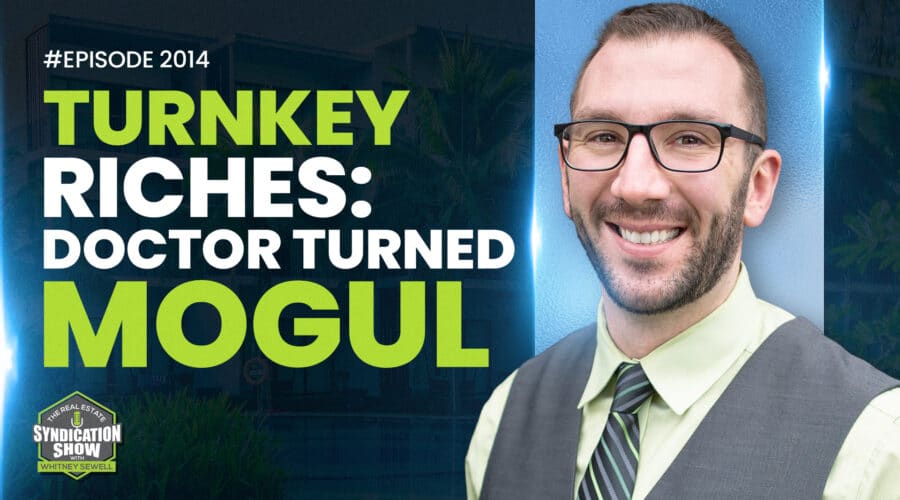Listen to the podcast here:
Sometimes there’s an excellent opportunity to have an investment out of state. However, it is reasonable to feel anxious about investing in a project that one has never seen. Logan Freeman, a former NFL player, real estate investor, and Founder of LiveFree Investments, helps us understand how out-of-state investments work. Logan shares four things and the significance of doing those that will help investors successfully invest in out of state. Get more information about out-of-state investing and see if it’s something for you as Logan walks us through it as well as building trust and rapport with investors.
Our Gracious Sponsor:
Investor Management Services (IMS) is the first and leading investor management software platform for CRE owners and private equity real estate firms who manage outside investors. With 400+ customers currently managing 50,000+ investors and more than $35 billion in equity on the platform, IMS will enable you to save time and resources, drive value, and improve the investor experience. Listeners will receive a 15% discount by using the link imscre.com/podcast. The IMS Platform – Productivity for You; Transparency For Your Investors.
—
Watch the episode here:
Making An Out-Of-State Investment with Logan Freeman
Our guest is Logan Freeman. Thanks for being on the show.
I’m super excited to be here, Whitney.
We’re grateful for your time and to share your expertise. Logan is an ex-NFL player at Raiders. He is now a real estate investor, developer and agent who has found his niche as an investment property specialist and representing buyers instead of sellers in the transactions process. He source acquired and renovated 120 transactions in less than a year. Logan has found a process and relies on his most valuable priorities to God his profit-producing activities. Logan is a husband and a father to a beautiful little girl. Logan is located in Kansas City, Missouri and can be found at LiveFreeInvestments.com. He’s an avid Christian working to leave his legacy. Logan, I admire you a lot and I appreciate you being on the show. Give the audience a little bit more about who you are.
I grew up in a little town called Jefferson City, Missouri, which if you’re an out of state investor and nobody knows that it’s the capital in Missouri. I played sports all through high school and then college and as you said, I was able to continue my career as a football player with the Raiders briefly. The only reason that I was able to make it that far was I had a work ethic that nobody else did. I wasn’t gifted physically, but I worked hard and they gave me a shot. It was a fun experience.
What happened after that was my life changed. After you have identified as an athlete for many years, whatever it is, you get cut from the one thing that you’ve done for your whole life and you have to sit back and look at your life and figure out, “What am I going to do?” During my collegiate career, I was focused on my studies as well and I was on the dean’s list every semester. I finished my Master’s after I got cut from the NFL. I went to work as a franchise consultant with a company called Jimmy John’s, which I’m sure many of you guys know. I was the youngest franchise consultant they had ever hired. I get the glass ceiling quickly and I wanted to get paid for my performance.
I went into a sales job in the trucking industry. It was a startup and if anybody’s been in a startup, it’s a big roller coaster. I wasn’t sure if the lights were going to stay on or not. I did that for two-and-a-half years and I went to what I thought was a cush and a comfortable corporate job. I was selling tech and services to the restaurant industry. It’s very comfortable for me. I was getting married. I came in one day and my stuff was in a box. I had sold a deal and I came in and I was let go. I had to figure out again that same deal that happened in football. You get cut and you have to reinvent yourself a little bit.
[bctt tweet=”You have to reinvent yourself a little bit.” username=””]
Throughout this process, I have been doing real estate transactions, mostly live in flips and trying to fuel my powder to go buy rentals. I was learning this process, educating myself throughout this whole deal. I have a good buddy who asked me multiple times to come on and be the director of acquisitions for his team. I said, “I’m going to do it,” but I didn’t jump head first 100% in. I started a consulting company and I worked with small businesses on training their people how to communicate their product and then putting processes in place on their sales team. As I was doing that, I was also selling fifteen investment properties a month. In June of that year, my wife looked at me and she said, “It’s been wonderful what you’ve been able to do, but you need to focus.” One of your guests, Trevor McGregor, talks about certainty, clarity and competence. I needed to get certain on where I wanted to go. I stopped doing consulting. I focused on real estate. I started learning about syndication and I started putting the people in place in my team that I could go build this and that’s what I’ve been doing. That’s what lands me to where I’m at.
I like how you talk about you were able to make it because you had the work ethic that nobody else had. I can relate to that. I don’t claim to be the smartest, but if you tell me it’s going to take a hundred hours a week to make it happen, I’m going to say, “Where do we start? Let’s get that a hundred hours started and let’s make it happen.” I like that and I can relate as well. You were talking about you were at that glass ceiling and you wanted something that was more performance-based because you’re willing to work hard. Tell me about when you made that decision to be more laser focused. Is it your wife that helped you think about, “You’re doing all these great things and you’re making it happen but what if you focus all that energy on this thing?” Tell me a little about that transition and how that changed things afterward.
There are two books that I would like to point out and one of them is Essentialism and the other one is The ONE Thing by Gary Keller. Both of those books, I reread them. I put that into place. When I started to think about if I could create an equation. This the way I looked at it, if I do X plus Y, then I can equal Z. I figured out what that equation was for my most valuable priorities. It was viewing properties and making offers. That’s what I needed to do. I viewed over 700 properties. I made over 450 offers and I positioned myself as the expert here in Kansas City as an investment property specialist instead of having to prospect for people. Before that, I was working so much in the business that I did not have time to look at the holistic picture and work on the business, and those two books and my wife who is a small business consultant looked at me and she said, “Why don’t you pick the one thing that provides you the most profit-producing activities and go do those things?” That’s how I got refocused on doing real estate instead of running my wheels crazy trying to build CRM systems for consulting clients.
It’s such a valuable piece of advice being able to focus on one thing instead of being spread out and trying to do many things. The one thing I’ve heard of and it’s been mentioned before, the other book, can you tell me the name of that again?
It’s called Essentialism. This is what’s important about this. It tells you exactly what to do. Essentialism is basically saying the same thing in a different way. It applied to me and it felt like it sunk in a little bit more than The ONE Thing did. I love both of the books. It’s the same message presented in two different ways. Your guests will enjoy reading one or the other. They are great in tandem.
Your businesses have changed a little bit. You’ve grown, you’re doing bigger deals, you’re working with investors and you’re syndicating deals. I appreciate you again sharing this experience. One expertise you have is working with investors and helping them to invest from out of state successfully. Let’s dive into that a little bit and tell me some of those problems and how you helped them.

There are four things that I try to help out of state investors understand or even agents that are working with out of state investors. When I tell my friends, family, whoever, what I do is they say, “You go buy houses and apartments?” I said, “No, I buy income streams.” That’s what we purchased. We don’t care what it looks like, not to an extent. Understanding the math behind that. When I think about an out of state investor, it’s scary for somebody like that to be placing capital into sometimes a project that they’ve never even seen. You understand that many of your investors, many of my investors have never seen the property. You’re focused on building that trust and rapport on the phone.
The only way to do that what I’ve found is to do what you’re going to say you’re going to do and be honest and you get everything out upfront. What I call that number one is clear expectations. When I ask the buyer, “What were you going to need to feel comfortable to move forward on this purchase?” I don’t want you to put an offer in until we get the documents that you need to work through. We need to run down what the taxes are going to be, what the insurance. We need to talk to a property manager, we need to look at lease rolls and rent rolls. That’s fine, but I take a backwards approach where I definitely don’t want to do that stuff after we’re under contract. My close rate is right around 90% of my transactions because of this. I might lose a couple of deals and that’s fine because I’m not giving an offering, but at the same time, I’m not wasting the seller’s time. I’m not wasting the buyer’s time because we have clear expectations going in. Not only has that helped me with my investors out of state, but it has also helped me with my reputation here in the Kansas City market. We perform and we are closer. That’s number one. Do you have any questions before we move on to number two on that?
Do what you say you’re going to be upfront. You’re asking them questions like what you are going to need to move forward and putting it out there. Letting them know they can ask questions because if you don’t ask, they may not even pursue the deal at all.
We get down many days into the transaction and you’ve got $5,000 in inspections, you’ve got all this time, effort and energy and we find something that we could have had before we even went under contract. It’s a much easier way to think about it, but it’s also backward whenever you think of a regular real estate agent. All they want to do is get something under contract and then try to figure it out. That’s not my approach. That’s that first one is those clear expectations. Number two I’m going to say is communication. There’s another great book that I cannot recommend enough and it’s from Chris Voss, Never Split the Difference. He calls it a negotiating book, I would call it communication book. That and Crucial Conversations and those two books have helped me have tough conversations with people and get things out on the table, not only from the seller side but the buyer side.
One example I’ll give you that bit me in the rear is we were working on a transaction of 32 properties. It’s about a $2.5 million, $2.6 million purchase. It was a lot of properties. Basically, I forgot to ask the buyer. The buyer had done a good job of winning me over by showing me their track records, showing me what they have done in the past. What I forgot to ask. There are two issues here. One is what their structure was on their syndication because I didn’t even know they were going to be syndicating this deal. I thought he was a buyer outright. Number two, what are the expectations on that structure to his investors? That was a big piece because we got down the road many days into the transaction. I underwrote the deal and he put it into his model and couldn’t figure out why we were not getting the right type of stuff and it was all because of the structure. Communication up front with your investor on what they’re trying to accomplish. Starting with the end in mind, how they’re going to get there and if they’re buying it outright or they’re going to go source capital as well. That would be number two.
Communication is the key. I also highly recommend both of those books that you recommended. Both of those were excellent reads.
[bctt tweet=”Pick the one thing that provides you the most profit-producing activities and go do those things.” username=””]
One thing I’d like to provide your audience too because I’m a weird guy. I like to read books within and I like to put them into book reviews like I’m in the eighth grade again. I basically dialed down all of their tools and tips of Never Split the Difference into a book review and actionable two-pager that you can implement and I’d be happy to share that with your audience as well. That’s something that we can provide for them.
I appreciate that value that you would give to them. Tell us how to get that or how we could connect them.
Number three, if you’re working with an out of state investor, an investor needs to think about the agent that they’re working with. They need to be willing to pay upfront. Here’s what I mean by that. Not pay the agent but pay to find some marketing dollars to get out there into the marketplace. The agents here are only as good as the network that they have. If somebody is serious about coming into a market like Kansas City and they have a specific property type that they want to work with. Multiple times in the past, I’ve been able to dial in using my resources: Reonomy, CoStar and property parcel records. I’ll create an awesome list, but that’s not necessarily my job to call that list or market to that list.
It’s my job to run that down after there’s been some interest expressed on the seller side. I do that all day, everyday different types of properties. Ones that are a certain threshold on a transaction side. I’ve had multiple investors expect me to do yellow letters and make the calls to those people and say, “If you find one, I’ll buy it.” I’ve got more buyers than anything. What I need you to do is put some effort upfront and spend a little bit of money to show me that you’re real to find a property. That would be the third one, be willing to pay upfront and show an investor’s agent that you’re willing to put some money into the marketplace. I’ve got some great questions that I ask out of state buyers to weed out who’s real and who’s not.
A lot of times it’s working through a deal together. This is a pro tip, so if there are any investor agents out there that are working with out of state investors, has a sample pro forma or an offering memorandum and say, “What I’d like to do is work with you on underwriting this opportunity.” It doesn’t even have to be a live one. It can be one that has closed or some deal that you never ever even looked at. Work through the financials together, see how they underwrite the deal and see if they understand what is going to make a good deal and not make a good deal and see what’s going to work for them. You will save so much time instead of going and trying to source deals off of Costar or LoopNet and then send these deals over to them.
If you work through one and take an hour to do it and work through the underwriting with them, you’ll know exactly what to send them going forward. You’ll also weed out a lot of people. This happened to me when somebody said, “What’s your investment criteria?” I said, “I need to get an IRR of 100%.” I looked at him and I was like, “You’re finding deals here in the Kansas City market with that?” “Yes, I don’t touch anything under a 100% IRR.” I said, “I need to think about that more in detail and I’m not sure I can provide that to you.” At the end of the day I knew that he was completely off on what he was trying to say and communicate. That showed me that he’s not a real buyer. He might say that he is, but he’s not. Be willing to pay upfront on some marketing dollars and work through an underwriting together. That would be number three.

As a buyer or a potential investor, I should be experienced enough and being able to work through that pro forma and have an educated conversation about those numbers and about what my buying criteria are, what types of deals you’re normally working with and what your experience is.
The last thing to get everything cleared upfront so you can perform. This piggybacks on number one. For example, I’ve got a listing on a 32-unit property and I’m telling those buyers that are contacting me on it. “I don’t think it’s good for us to put an offer in until you have done the whole process that you can perform.” This is where I asked for, “Where do you own other properties? Have you syndicated before? Do you own anything outright? What is it going to take for you to perform?” I have them talk to the local bank that we’ve done multimillion-dollar transactions with and say, “Can you underwrite this person for me and see if they’re a real deal?”
The bank can’t necessarily tell me what they find out but they can say, “I couldn’t give them a preapproval letter.” Once again, if you can get everything cleared upfront so that they can perform, an out of state investors going to have so much more success working with an investor’s agent like me if they’re going to perform and everything is taken upfront. Those are the four things. Let me run through them one more time. Having clear expectations, what you need to do to have your due diligence and criteria and then having good and solid communication between both parties.
Be willing to pay a little bit up front and make a good faith estimate and then get everything cleared upfront so that you can ultimately perform. Because if you perform, I’m going to bring you more transactions before I bring anybody else. None of my transactions that happened you’ll ever see listed. It’s because I meet with people 30 hours a week. We find new deals, I host a meetup, we do all of these different things that Joe Fairless and Trevor McGregor would say to do, but none of those are going to come. I get to pick and choose who I send those too. If you’ve performed in the past or can do those four things, I will be incentivized to send you my off-market opportunities that are never going to hit the internet.
What should we be willing to pay upfront or what are we paying for?
I think that if you have a specific property type, pay is in two ways. Pay with time, your time as an out of state investors to underwrite the deal. For example, I had a guy who wanted to do some marketing to some off-market fourplexes. He had a specific property, it’s called the PCA Code here in Missouri. It was a garden style fourplex that he wanted. He wanted it to be built after 1980, so I was able to pull him a list easily. What he did was he went down the list and he figured out which ones in the right areas that he wanted to market to and he and his wife sat down and they wrote 35 different yellow letters to these sellers explaining his situation. He ended up buying two of those properties and getting to have them under contract. He closed on one and he wholesaled the other one and used the money from the wholesale to pay for his down payment on the other one. All in all, he said he spent about $250 on that. Buying the postage and some other things like that, but it was mostly his time. I’m not saying that you need to spend a lot of money upfront, but be willing to spend time with that investor’s agent. If they do provide you something, then you’ll spend the time to do what you’re going to say you’re going to do as well. It’s a two-way street on that piece.
[bctt tweet=”Have a stronger faith in yourself.” username=””]
You’re showing some investment. Even if it’s your time, you’re going to notice that I’m going to take the time even to come there and meet you and see the property in person. That’s an investment.
That’s another great example. Get on a plane and come. I will spend all day with you and we will go look at properties. That’s a huge investment. I know people that are willing to do that are about spending money here.
Even if we don’t close on the deal I’m coming to look at, it’s continuing building our relationship. You see serious. You’re going to learn a lot about me about spending that day or even half a day with me and each other and our conversations. What’s been the hardest part of the syndication process for you so far?
I would say systemizing the actual process itself. This has been a learning experience for us when we have gone into the syndication piece. My partners and I own over 650 apartment complexes and a bunch of commercial buildings but at the same time, we’ve never had to go out and syndicate those properties. I’m figuring out the process with working with SEC attorneys and getting a PPM put together, subscription agreements and getting people to fund the deal. Even though they’ve said that they are interested, signed letters of intent, gave us soft commitments. When it came to fulfilling those, we had a lot of last-minute people who did not. Thankfully, I foresaw that and I had multiple people to call and I had spoken to and was able to close the transaction.
The most difficult thing would probably be following some type of process from internally at my company, but also with them and with the investors making it. My wife works in customer experience and trying to figure out how to make that experience better. I can tell you, my investors, those experiences on these first three have not been that great. The toughest thing for us would be systemizing that process, making it clear because when you have twenty-some investors and an opportunity or whatnot, that’s a lot of communications. Going through operating agreements, the changes with the lawyers and all of those things have been difficult for us to nail down the process on. I would say that’s the number one thing that we’ve struggled with.
What’s a way that you’ve improved your business that we can apply to ours?

I had my baby in February. Before that, I was a 3:30 AM guy. I work through this productivity planner by Brendon Burchard every single day. The number one thing that’s made my business explode and understands what’s going on is setting up my day before 8:00 hits. If I can own from 4:00 to 8:00. Hal Elrod is a guy who has a podcast. He works for The Miracle Morning. I bought his book. It’s silence and prayer for me, affirmations, visualization, exercising, reading and writing. A lot of that is already put into Brendon Burchard’s high-performance planner and I love this thing. I worked through that every single morning. From setting the day up, but also it has an evening routine as well that you go through your day. My number one thing is reviewing and setting my days up.
I appreciate you elaborating on that a little bit and the productivity planner. You’re even saying that I need to own my morning from 4:00 to 8:00. I like that and I need to own that time so I’m best prepared for the day. What’s the number one thing that’s contributed to your success?
It’s having faith. Lewis Howes is a guy who had The School of Greatness Podcast. He was one of the first ones when I got cut from the NFL that I started to reinvent myself. He says that to be successful or all successful people have either a strong unwavering faith in themselves or a Higher Power. Having faith in a Higher Power that has led to having a stronger faith in myself. Believing in myself, believing in God and letting that work through my activities every single day has absolutely been the number one. When you’re on this entrepreneur’s rollercoaster, there are a lot of days where you feel like, “I’m not sure why I’m doing this.” If you’re easy to go down the street and get a job, but there are other days where you’re like, “I would never do anything else.” That delta between those two is where you have to have faith. That’s what I would say.
How do you like to give back?
I started a foundation here in Kansas City to help the homeless. We’re not a huge city, but we do have a strong population of homeless people. We started what’s called CareKit KC. Three or four times a year, we’re able to pack these green drawstring bags with sunscreen or clothes or food, whatever that the season might be. We’ve grown to do over 500 every single packing. After our service on Sundays at church, we hand them out to our families who then go out and onto the plaza and the surrounding areas here in Kansas City. It’s cool to watch. We put cards in there for information on food pantries and bus passes and all these things on where to go get help and a number to call. It’s great to see people walking around with those care kits on their back and it feels that is helping make a difference. I run that foundation in my free time. That’s how I like to give back here in the KC area and hopefully that will continue to grow.
Tell the audience how they can learn more about you and get in contact with you.
My email address is [email protected] or LiveFreeInvestments.com. Everything I ever post or do, you want to get ahold of me there. My marketing team will get me whoever comes through the website and we’ll get on a call that way.
Thank you for sharing your time and your expertise. I appreciate you and give the audience the value. I hope the audience will connect with Logan. I hope you also go to Life Bridge Capital and connect with me. I’d love to have a conversation with you and hear about your experiences and hopefully I can help you in some way. Go to our Facebook group, The Real Estate Syndication Show where we can all grow our businesses and learn together and from experts like Logan and we will speak to each of you next time.
Thank you.
Important Links:
- Logan Freeman
- LiveFreeInvestments.com
- Trevor McGregor – past episode
- Essentialism
- The ONE Thing
- Never Split the Difference
- Crucial Conversations
- Reonomy
- CoStar
- LoopNet
- Joe Fairless
- Brendon Burchard
- The Miracle Morning
- The School of Greatness Podcast
- [email protected]
- The Real Estate Syndication Show – Facebook group
- HOW TO NEGOTIATE
About Logan Freeman

Logan has also completed multiple joint venture projects, equity partnerships and works as a developer. Completing over 120 transactions in less than a year, Logan has found a process and relies on his most valuable priorities to guide his profit-producing activities.
Logan is a husband, and father to a brand new baby girl. Logan is located in Kansas City Missouri and can be found at livefreeinvestments.com
Love the show? Subscribe, rate, review, and share!
Join the Real Estate Syndication Show Community:



